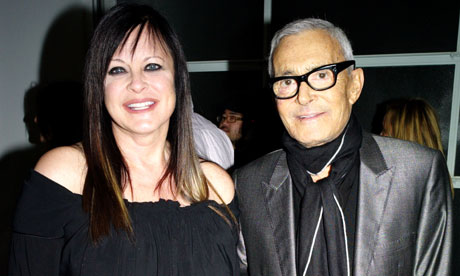
Celebrity hair stylist Vidal Sassoon, who revolutionised women's cuts in the 1960s with his sharp geometric styles, has died at his home in Los Angeles aged 84.
Police were called to Sassoon's mansion on Mulholland Drive, Beverly Hills, at about 10.30am on Wednesday where they found the stylist dead.
A police spokesman said they determined he died of natural causes and there would be no further investigation. Sassoon was reported last year to have been suffering from leukaemia.
Sassoon worked himself up from a barber's apprentice to achieve international fame and fortune with hairstyles including the bob and the "Nancy Kwan".
He was born in Hammersmith, London on 17 January 1928 and he and a younger brother moved with their mother to the city's East End after they were abandoned by their father.
He was sent to a London orphanage where he spent six years before being evacuated during the war to Trowbridge, Wiltshire. On his return to London, aged 17, his mother took him to a barber shop in Whitechapel and insisted the owner give him an apprenticeship.
He opened his own Bond Street salon in 1958, and his trademark five-point bob revolutionised hairdressing.
In an interview with the Observer last year, Sassoon said: "From my 14th birthday on, my mother encouraged me to be a hairdresser. She had this premonition. But had I gone to college I would have definitely chosen architecture, without question. That's where my inspiration lay. Cutting hair for me was just creating shapes, always inspired by buildings."
His wash-and-wear cuts marked the end of the beehive and the bouffant hair styles of the 50s, earning him many famous clients and admirers including the Duchess of Bedford, model Jean Shrimpton, actor Terence Stamp and fashion designer Mary Quant, who called him the "Chanel of hair". He gained further fame when he was flown to Hollywood from London, at a reputed cost of $5,000, to create actor Mia Farrow's pixie cut for the 1968 film Rosemary's Baby.
He was also a driving force in the commercialisation of hairstyling, turning his craft into a multimillion-pound industry. He opened more salons in England and his business expanded to the US.
He also developed a line of shampoos and styling products bearing his name. His slogan was: "If you don't look good, we don't look good."
The hairdresser established Vidal Sassoon Academies to teach how to style hair based on a client's bone structure.
He sold his company in the early 80s to devote himself to philanthropy, but later said he regretted the decision.
"It was the most foolish mistake I ever made. American business being what it is, they sold out to another company a year later, and all the promises were forgotten. I was devastated," he told the Observer.
Sassoon, a veteran of Israel's 1948 war of independence, was also prominent in a campaign on behalf of Jewish ex-servicemen, and in 1982 founded the Vidal Sassoon international centre for the study of antisemitism, a non-political organisation at the Hebrew University of Jerusalem.
He recalled his teenage years, saying: "I used to turn up at the salon with cuts on my hands from fighting. It was the end of the war; Sir Oswald Mosley was a prisoner in his own house, but his supporters kept marching.
"I'd come into the salon with terrible bruises on my cheek and say: 'Madam, I just tripped over a hairpin.' "Married four times, Sassoon had four children with his second wife, Beverly Adams, a film and TV actor.

